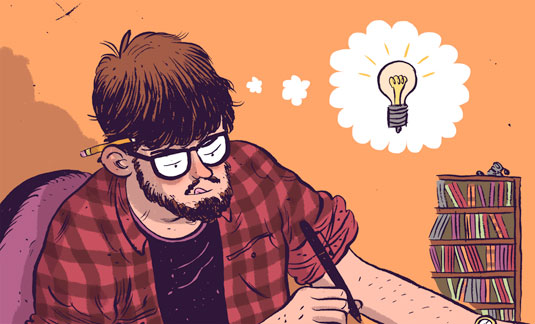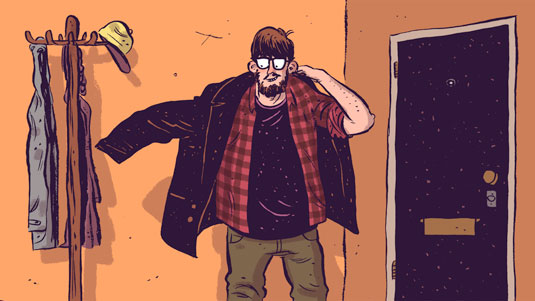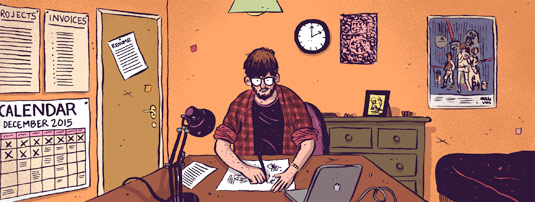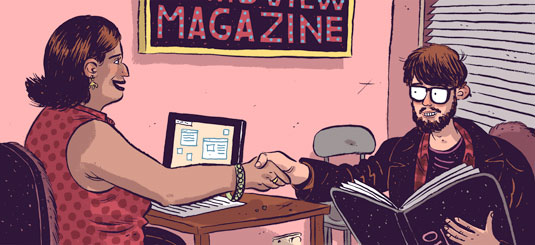25 tips for staying sane as a freelancer
Banish procrastination, boost productivity and always get paid with these pro tips for freelancers.
11. Know who you can bounce ideas off

Working on your own does not mean you're the sole survivor in a post-apocalyptic world. "It's risky but you can also use the art director that you're working with," adds Pâté.
Bouncing ideas off the art director of The Washington Post for a recent project meant better results, even though the initial concepts were rejected. "The ideas that I came up with second time round were so much better than the first," he adds.
12. Don't be an island
Freelancing can be a lonely business, affecting not just your social wellbeing, but the opportunity to learn from others. Meetups like Yo Illo, Glug, The Big Draw, as well as local exhibitions, will keep you sane and offer informal spaces to delve into how your idols got started, practical portfolio tips and views on different agencies and clients.
13. Try a skill-swap
It's a big feat to approach a creative you admire even if it's just to suggest a coffee – the key for confidence is not to go empty handed. "What has worked for me is to skill swap, rather than taking something for nothing," says Patel.
When launching a range of tote bags, Patel helped a textile designer he met at designer-maker meetup Crafty Fox with some illustrations in exchange for her thoughts on potential manufacturers and retailers. The result was that both parties benefitted from money-can't-buy expertise.
14. Put on an event yourself
The skill swap approach can also be less direct: tempt your heroes to meet you by putting on events so exciting or innovative, they won't want to miss out.
15. Don't overlook the human touch

Real-life networking is also essential for winning pitches: take the time to meet someone and you'll come to mind quicker than a name on an email signature.
Get the Creative Bloq Newsletter
Daily design news, reviews, how-tos and more, as picked by the editors.
Researching the client, and making sure your portfolio is geared towards their interests is obvious, but it's the human touch that people often overlook, says illustrator Ben Tallon.
"Out of fear and respect for a client you don't treat them with the kindnesses you would your friend. If you find out your client has a family, ask about their family. Perhaps they like football or the same band as you. Ask them if they're better if they've been off sick."
Tallon's approach has paid off professionally and personally. "I remember going to see Sam Price at The Big Issue when I first started out, and he was like a God to me. I went to his wedding last week!"
16. Follow up on initial meetings
After the initial meet, a next day follow-up is crucial, says freelance designer Gordon Reid.
"If you meet a creative director at an event and you don't have their email, tweeting them to say thanks is a really good way of keeping in contact. It's likely that they'll add you back, and then six months later, they'll still be looking at your work."
17. Appreciate your followers
Networking is not just about clients and collaborators, it's about appreciating followers too. "I have a New York fan with a big Instagram following, and whenever she posts a picture of my work I get another 50 followers," says photographer Jess Bonham.
It gets better: "When I went to New York I arranged a meeting with her to chat and say thanks," she adds. "It led to another project for a magazine called Coach."
18. Know how to hustle

Sadly the hustle doesn't end once you've done the job – the bane of every freelancer's life is getting paid. "I've sent emails in the past saying: 'Please can you pay me as I need to buy food,' which was true at the time, although it didn't make much difference," sighs Andrew Rae.
"Most people get round to it eventually but it can be really annoying and 90-day payment periods seem to be becoming worryingly normal on agency jobs – it's a disgrace."
19. Agree your fee first
First things first, make sure that the fee is agreed before you do any work on a job. "People will take advantage of you," says Jess Bonham.
"Just the very fact that you're showing them that you're taking the budget seriously and you want it to be transparent, makes them realise that they can't mess you about."
20. Have clear T&Cs
Like many freelancers, Cheetham has 30-day payment terms, and charges a 5 per cent late fee, which goes up to 10 per cent after 60 days, but he admits they're largely a deterrent. "It's good that they're written there, but you could have written anything," he laughs.
22. Join an industry body
Cheetham recommends joining an industry body like the Association of Illustrators, UKWDA or DBA, as the former has given him legal advice on non-payment but has also helped him with pricing.
"You can ping them over project details, and they'll give you advice on fees." This was essential when he was entering the uncertain world of licensing existing un-copyrighted work.
23. Arm yourself with insider intelligence

If you're working for a client on a regular basis, get to know what their policy is so that you can beat the system armed with insider intelligence.
"If you're unlucky enough to time an invoice wrong, you might be looking at six to eight weeks, as opposed to 28 days," Tallon explains.
"And it becomes difficult then because a client has to alter their company policy to meet your invoice terms. Most people just won't do that."
24. Play the reliable card
Working with the system also has its advantages. "One of the benefits of being reliable is that you can say, "Am I okay to invoice this two days before the brief because I'm a bit skint?" and people who know you are generally fine with that and will process it early," he adds.
25. Chase repeatedly if you have to
But, sadly, sometimes you're pushed so far into a corner that your only option is to make yourself as annoying as humanly possible. Follow up a late payment with a friendly email, but if no response is forthcoming then don't be afraid to escalate.
"Ideally contact the right person in the finance department, so you can separate the person you have to be stern with from the creative person," says Bonham.
"But essentially, if you've done a good job for somebody, and they haven't paid you, then they should be the person to feel ashamed. There is nothing wrong with chasing them repeatedly, and don't work for them again."
This article was originally published in Computer Arts, the world's leading design magazine. Subscribe here.
Related articles:

Thank you for reading 5 articles this month* Join now for unlimited access
Enjoy your first month for just £1 / $1 / €1
*Read 5 free articles per month without a subscription

Join now for unlimited access
Try first month for just £1 / $1 / €1
